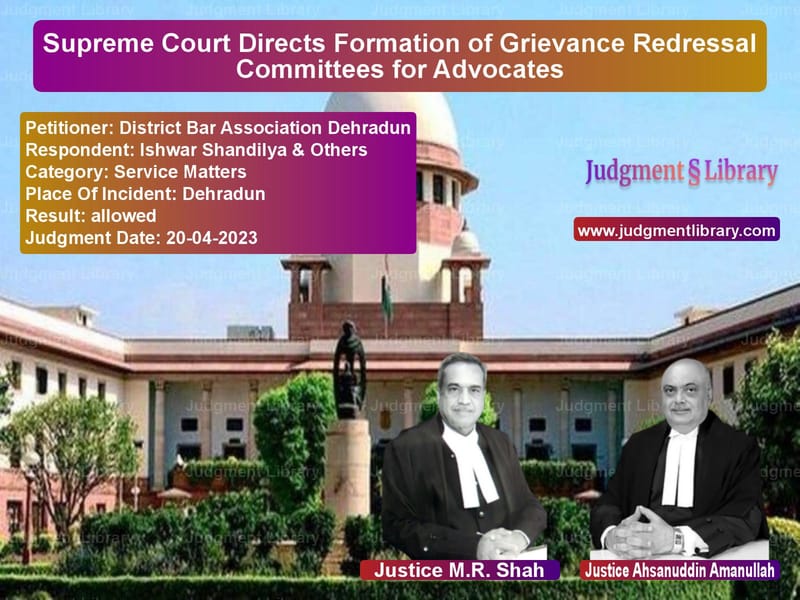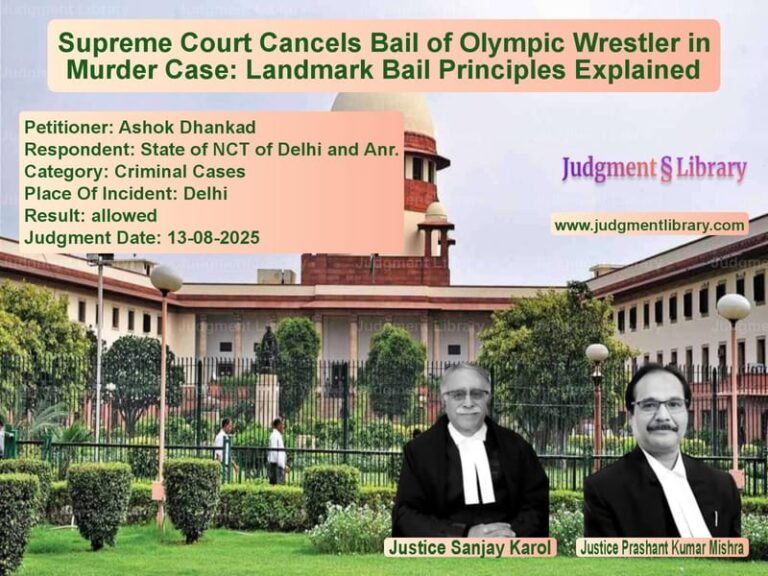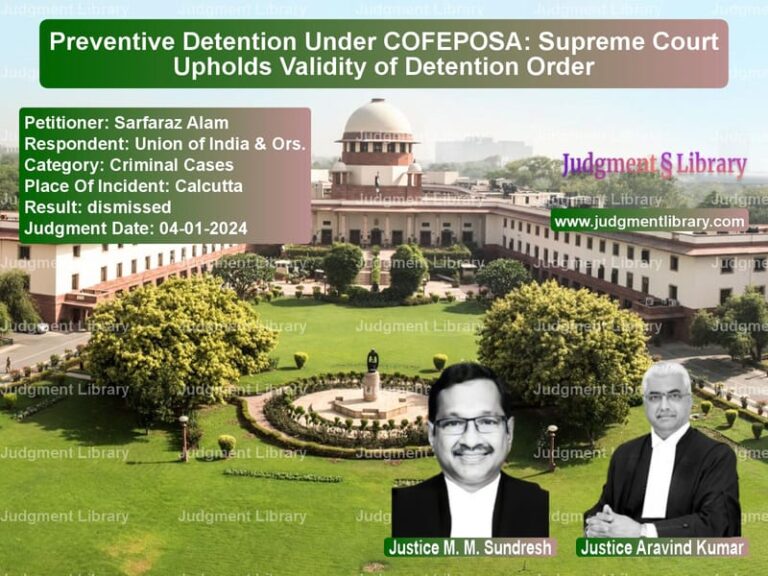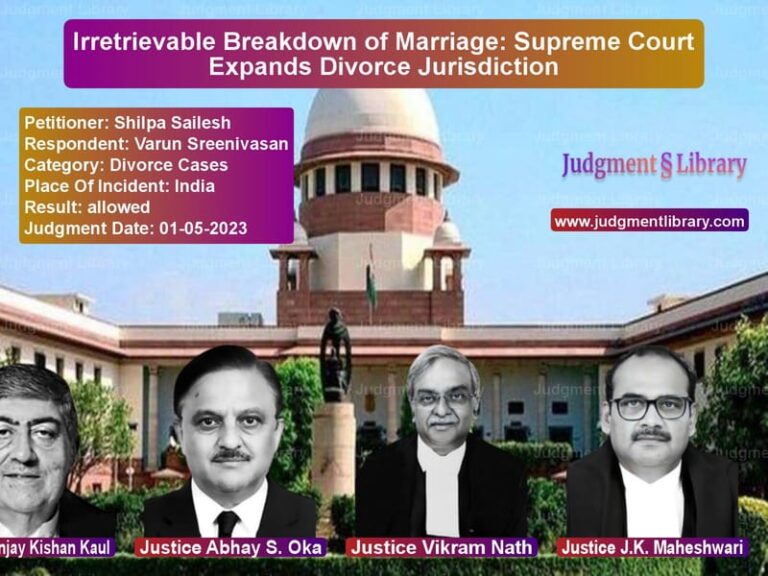Supreme Court Directs Formation of Grievance Redressal Committees for Advocates
The Supreme Court of India, in the case of District Bar Association Dehradun v. Ishwar Shandilya & Others, addressed the recurring issue of lawyers going on strike and abstaining from work. The Court emphasized the need for a structured mechanism to address the grievances of advocates, directing all High Courts to establish Grievance Redressal Committees (GRCs) at various levels.
Background of the Case
The Bar Council of India filed an application in an ongoing case, seeking appropriate directions for the constitution of Grievance Redressal Committees to handle concerns raised by lawyers and bar associations. The Bar Council argued that frequent strikes by lawyers stem from unresolved grievances related to procedural changes, misconduct by judicial officers, and administrative decisions affecting the legal profession.
Read also: https://judgmentlibrary.com/annual-increment-on-retirement-supreme-court-upholds-employee-rights/
Advocates often resort to strikes due to dissatisfaction with issues such as procedural delays, listing of cases, or perceived misconduct by judicial officers. The Bar Council proposed a formal mechanism to address these grievances, which would ensure that legal professionals have a designated forum to voice their concerns.
Petitioner’s Arguments (Bar Council of India)
The Bar Council of India, represented by Senior Advocate Manan Kumar Mishra, presented the following arguments:
- Frequent strikes and boycotts by lawyers negatively impact the justice delivery system and disrupt court proceedings.
- A structured forum for grievance redressal is necessary to address lawyers’ concerns, reducing the need for strikes.
- Lawyers often face procedural challenges, listing delays, and misconduct by judicial officers, which necessitate intervention.
- The Bar Council proposed a multi-tiered Grievance Redressal Committee structure at High Court, District Court, and Taluka levels.
- The Committee would include judicial officers, representatives of the Bar, and government officials to ensure impartiality.
Respondent’s Arguments
The respondents in the case opposed the proposal, stating:
- Lawyers have other legal avenues to address their grievances, such as filing complaints with judicial authorities.
- Establishing additional committees might lead to bureaucratic delays rather than resolving issues.
- Allowing Bar Associations to influence judicial functioning could impact judicial independence.
Key Legal Issues
The Supreme Court examined the following legal questions:
- Can lawyers legally go on strike or abstain from court work?
- Is the formation of Grievance Redressal Committees necessary to address lawyers’ concerns?
- What is the appropriate structure for a grievance redressal mechanism?
Supreme Court’s Observations
The Court ruled against strikes and emphasized the need for alternative redressal mechanisms, stating:
- “No member of the Bar can go on strike or abstain from court work.”
- “If an advocate has genuine grievances related to procedural changes, listing of cases, or judicial misconduct, they should be addressed through a proper grievance redressal mechanism.”
- “Lawyers are part of the justice delivery system, and their issues must be resolved in a manner that does not disrupt court functioning.”
The Court further stated that:
- “We request all High Courts to constitute Grievance Redressal Committees at the High Court level, headed by the Chief Justice.”
- “These committees should also be set up at the District Court level to address issues faced by advocates at all levels.”
- “The Committees may consider complaints related to case listing, procedural changes, and judicial misconduct, provided they are genuine and not meant to exert undue pressure on judicial officers.”
Structure of the Grievance Redressal Committees
The Court outlined the composition of the Grievance Redressal Committees:
- At the High Court level:
- Chief Justice (Chairperson)
- Two senior judges (one from service and one from the Bar)
- Advocate General
- Chairman of the State Bar Council
- President of the High Court Bar Association
- At the District Court level:
- Principal District Judge (Chairperson)
- Two senior judges from the District Court
- President of the District Bar Association
- Representative from the State Bar Council
Final Judgment
The Supreme Court disposed of the application, issuing the following directions:
“All High Courts are directed to constitute Grievance Redressal Committees at the High Court and District Court levels within their respective jurisdictions. The Committees shall handle genuine grievances of advocates to ensure that judicial work is not disrupted due to unnecessary strikes.”
The Registry was directed to send copies of the order to all High Courts for implementation.
Impact and Legal Significance
- Reinforces the illegality of lawyer strikes: The ruling confirms that lawyers cannot disrupt court proceedings through strikes.
- Provides a structured redressal system: Advocates now have a designated forum to address grievances, reducing the need for protests.
- Ensures judicial accountability: The inclusion of judicial officers, bar representatives, and government officials ensures a balanced approach.
Conclusion
The Supreme Court’s decision in District Bar Association Dehradun v. Ishwar Shandilya is a landmark ruling that seeks to balance judicial independence with the rights of legal professionals. By mandating Grievance Redressal Committees, the judgment aims to reduce the frequency of strikes while ensuring that advocates’ concerns are addressed in a structured manner. This decision strengthens the rule of law by maintaining the continuous functioning of courts while allowing lawyers to seek redress for their grievances through proper channels.
Petitioner Name: District Bar Association Dehradun.Respondent Name: Ishwar Shandilya & Others.Judgment By: Justice M.R. Shah, Justice Ahsanuddin Amanullah.Place Of Incident: Dehradun.Judgment Date: 20-04-2023.
Don’t miss out on the full details! Download the complete judgment in PDF format below and gain valuable insights instantly!
Download Judgment: district-bar-associa-vs-ishwar-shandilya-&-o-supreme-court-of-india-judgment-dated-20-04-2023.pdf
Directly Download Judgment: Directly download this Judgment
See all petitions in Public Sector Employees
See all petitions in Legal Malpractice
See all petitions in Contempt Of Court cases
See all petitions in Judgment by Mukeshkumar Rasikbhai Shah
See all petitions in Judgment by Ahsanuddin Amanullah
See all petitions in allowed
See all petitions in supreme court of India judgments April 2023
See all petitions in 2023 judgments
See all posts in Service Matters Category
See all allowed petitions in Service Matters Category
See all Dismissed petitions in Service Matters Category
See all partially allowed petitions in Service Matters Category







